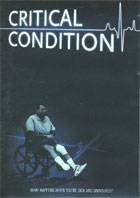
Critical Condition 2008
Distributed by Filmakers Library, 124 East 40th Street, New York, NY 10016; 202-808-4980
Produced by Roger Weisberg
Directed by Roger Weisberg
DVD, color, 82 min.
Sr. High - Adult
Health Sciences, Political Science, Social Work
Date Entered: 03/26/2008
Reviewed by Lori Widzinski, Health Sciences Library, University at Buffalo, State University of New YorkJoe has chronic liver disease and needs a lot of expensive medications to keep his symptoms under control. Because he is one of the 2.2 million Americans without health insurance, he skimps on his medication and uses injection needles repeatedly. The stress of his illness is hard enough on his family, particularly his wife Dale, but add on the continuing stress of a growing debt from unpaid medical bills and they are falling apart at the seams.
Karen knows there’s something wrong, but delays going to the hospital because she doesn’t have insurance. When she can procrastinate no longer the diagnosis is ovarian cancer. Karen and her husband and family take on the fight of her life struggling to stay on a payment plan for the astronomical medical costs. Karen, like 80% of the uninsured is from a working family.
Carlos is in constant pain because of a crippling back condition. He nearly bleeds to death from extended Tylenol use to help control the pain. His wife is expecting their third child. He could no longer afford insurance, explores the options of surgery in Mexico, and is lucky enough to find a doctor at UCLA and become involved in this film, which allows him to be part of a free surgery program.
Hector has diabetes and a severe foot infection. He is working and has health insurance, but is caught between time and money. His doctor wants him to wait to give his foot a chance to heal before they even consider a surgical option. He doesn’t have the time to wait. He is out of sick days, and in danger of losing his insurance if he doesn’t act, so he decides to have his foot amputated. Hector and 130 billion other American cost the U.S. economy 130 billion dollars a year in lost productivity. When complications set in, he loses his job, and his insurance.
Weisberg sets the stage for health care reform in the U.S. through the cases of these four working class Americans who do not have health insurance for a variety of reasons. They all worked or are working, and yet they can’t pay for the treatments they need. Some are caught in the bureaucratic cycle of Social Security Disability and Medicaid, some forgo medical care, and some have the stress of mounting debt that will continue for many years.
Expertly filmed and edited, Critical Condition is a first-rate addition to the growing body of documentaries on the health insurance crisis in the United States. Weisberg creates an emotional bond with each of the families profiled, and twists the knife a little more after each segment with staggering statistics (which are growing worse by the day). This poignant portrait of working Americans who cannot afford to seek medical help is sure to be a discussion starter in the classroom. A bit lengthy for class viewing at 82 minutes, it could be shown in segments. It is an important enough film that it will be a valuable addition to academic libraries supporting health sciences and even political science curricula.